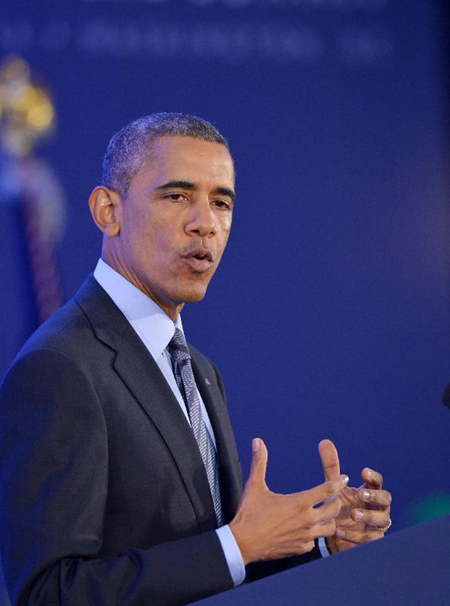President Obama's cautious view of China
- By Tim Collard
 0 Comment(s)
0 Comment(s) Print
Print E-mail China.org.cn, August 10, 2014
E-mail China.org.cn, August 10, 2014
|
|
|
U.S. President Barack Obama speaks at a press conference during the U.S.-Africa Leaders Summit in Washington Aug. 6, 2014. The U.S. will help build a rapid response force in Africa in a new peacekeeping partnership with the continent, Obama said on Wednesday. (Xinhua/Yin Bogu) |
On Aug. 2 the Economist published a wide-ranging interview with President Obama about the United States' view of the general world situation. Inevitably, the future of relations with China featured prominently in the president's presentation.
The Economist asked the president about the impact of Chinese investment and wider involvement in Africa, given that the Chinese investment and involvement model is different to that traditionally offered by Western countries and the international development agencies. President Obama acknowledged that China had some clear comparative advantages in providing practical development aid, particularly in the field of infrastructure – roads, bridges and ports. China not only has specialist expertise in these fields, but also has much more flexible capital to put into such schemes.
President Obama also emphasised that the key point was that African governments should negotiate an optimal deal with whichever partners they are dealing with, whether China or a Western country. The president was here referring obliquely to a perennial problem with aid to developing countries: that the leadership of such countries often has specific interests which may not coincide with the interests of the country as a whole. While China has no interest in interfering in another country's internal affairs, such factors can still have a huge influence on the long-term success or failure of a development project. President Obama pointed out that any agreement aimed one-sidedly at acquiring access to African natural resources would be unlikely to benefit the African partner in the long run.
The Economist also asked the President about the recent creation of a BRICS development bank, to be based in Shanghai. Obama welcomed China's full participation in international financial activities, suggesting that China would increasingly come to value what he called "international norms" as its domestic economy moved up the value chain and became more competitive at all levels. In this context, he made a particular reference to intellectual property, long a Western concern but likely to become a Chinese one also.







Go to Forum >>0 Comment(s)